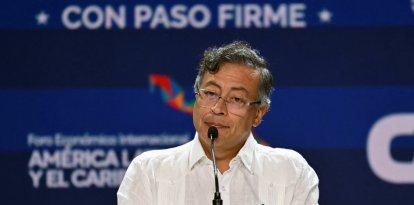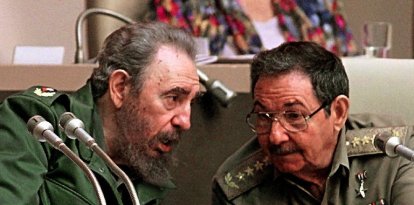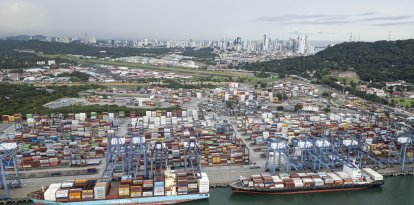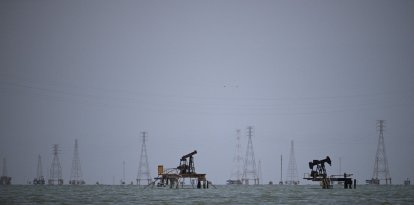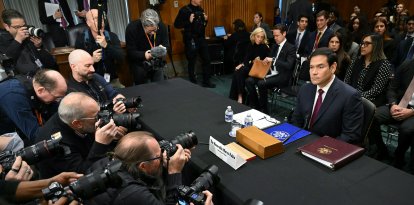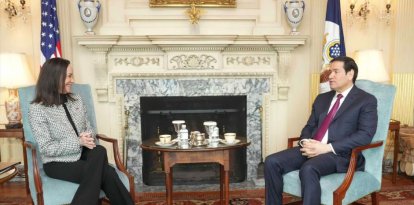Critic of Islam, Eurosceptic and pro-Israel: Meet Geert Wilders, the conservative politician who took the Netherlands by storm
The European progressive media is frightened by the triumph of the anti-globalist leader.
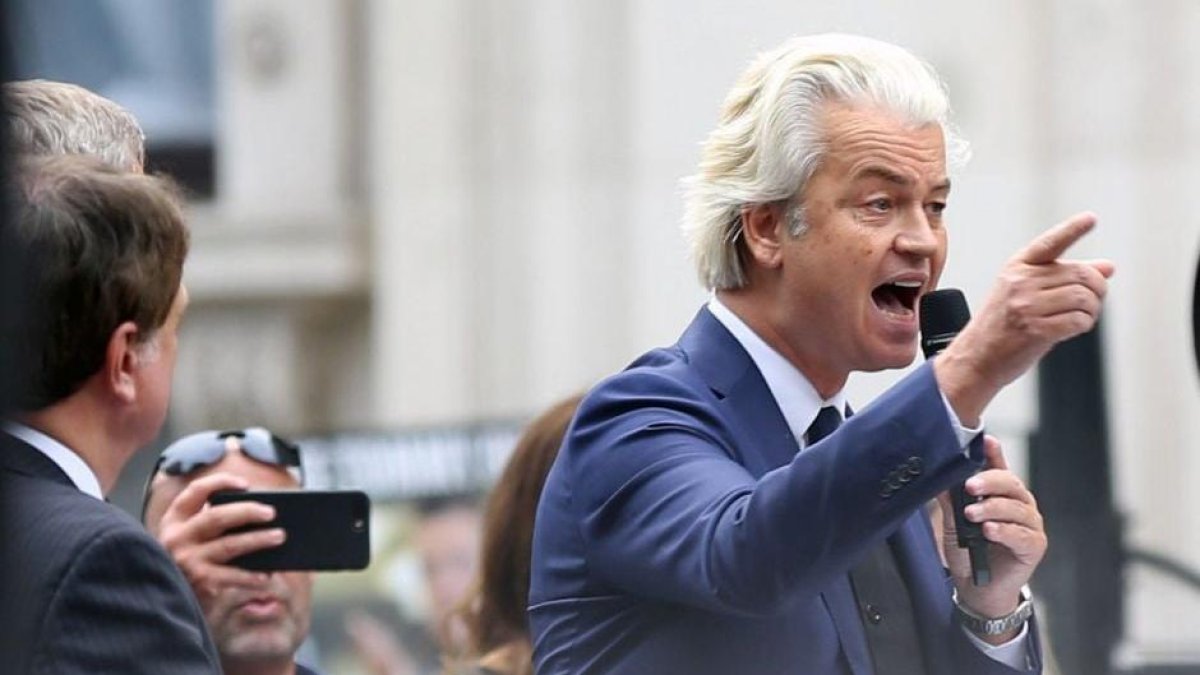
(Cordon Press)
"Far-right" is one of the terms most trivialized by Western media in recent years. Days ago, a declared "ultraliberal"—or libertarian—like Javier Milei won the elections in Argentina and was branded by a large part of the Western press as "ultra-rightist." Days later, the same thing happened in the Netherlands with Geert Wilders, the leader of the anti-globalist Party for Freedom who, against all odds, swept the parliamentary elections, taking 37 seats that opened a small floodgate for Wilders to put together alliances to forge an unprecedented government coalition in the Netherlands.
Although Wilders and Milei are not ideologically close on many issues, especially social ones, the media spares no effort in branding them both as "fascists" or "ultra-rightists." A term that the Dutch politician fervently rejects.
"We are a country of consensus-building. We don't even have that many far-right people in our country; we never will," Wilders told the BBC. "Indigenous people are being ignored because of the mass immigration... they feel mistreated."
With Wilders, in particular, the anger has been going on for decades, as his immigration rhetoric fervently embodies values that go against progressive Western postulates.
This situation, far from harming Wilders, has catapulted him. Instead of being the only "far-right" leader in the Netherlands, the Dutchman began to be known about seven years ago outside his country and Europe as the "Donald Trump of Netherlands," a nickname that matches his conservative electoral program and his golden hair.
In fact, flattered by the nickname, Wilders visited the United States and went to the Republican convention in Cleveland (Ohio) to witness the triumph of the candidacy of the New York billionaire, who would later reach the White House in one of the most important political events of history.
But the Dutchman is a very particular leader, hardly comparable to other Western leaders, especially outside Europe, since he was molded and designed in the likeness of the problems that afflict his country and many of the powers of the European Union.
Against the Islamization of Europe and mass asylums
The Dutchman achieved his popularity by being one of the first politicians to take a stand against the "Islamization" process that affects almost all of Europe. This point of view, until recently, was seen as a completely radicalized position in the old continent. However, with the current migration crisis, a product of intense Muslim migration, it is increasingly accepted within the European electorate, not only in the Netherlands but also in Spain, Italy, France and Germany, where conservative programs are advancing firmly.
But Wilders should be credited for being almost a pioneer in this rhetoric. He is not a politician who rode a conservative-populist wave, and that's it.
The conservative has been a harsh critic of Islam for decades, even fearlessly proposing solid measures such as the elimination of mosques or the coram. Proposals that have earned him the target of death threats and even attacks.
In fact, Wilders is one of the most protected men in the world because, quite simply, Islamic terrorism has been looking for him for years to cut his throat. No person can visit Wilders without first being authorized well in advance. The Dutch politician cannot leave the house without being accompanied by half a dozen guards provided by the state. In 2017, he was even assigned members of a special military police unit. He is a man who runs a terrible risk for his stances against radical Islamism.
For many, perhaps, it is strange that a politician from the Netherlands, a land known globally for being calm and even inclusive, has such levels of protection. Still, history shows that this country has directly witnessed assassinations (Pim Fortuyn, in 2002) and terrorist attacks (Theo van Gogh, in 2004) in the name of the Islamic fundamentalist. Such a person like Wilders, whose mentor was the Dutch politician Frits Bolkestein, is an easy target for Islamic terrorism.
This position against Islam and large-scale Muslim migration to Europe added to his rhetoric against open borders, and massive requests for asylum earned him enmity from progressive politicians in the European Union and the Western press. However, despite harsh criticism, the Dutch, a society that historically chooses the center to seek consensus, has given the opportunity to form a government to a man who, throughout his political career, opted for frank and direct speech.
And Wilders, as the years have passed, has also improved his communication methods. In the most recent electoral debates, he was the candidate who looked the best, mainly because the various political groups that make up the right adopted an "anti-immigration" discourse similar to that of Wilders himself. The original version will always be better than the replica in that context.
"The Netherlands can't take it anymore," said the Eurosceptic leader. "We have to think about our own people first now. Borders closed. Zero asylum-seekers."
Even taking advantage of the similarities with Trump, Wilders also covered the former American president's famous slogan for his country: "We are going to make sure that Dutch voters will be put first again." A phrase that perfectly encompasses the ideals of the conservative leader.
Eurosceptic, anti-kyiv financing and pro-Israel
During a period of his life—between 1981 and 1983—Wilders lived in Israel and traveled to several Middle Eastern countries, including Iran, Syria, Jordan and Egypt. From that moment on, the Dutch politician forged a clear line of thought, maintaining a clearly pro-Israel discourse, a country that he considers a Western ally and "the West's first line of defense against Islam."
While most Western leaders believe that Israel has the right to defend itself from Hamas terrorist attacks, Wilders' support seems more unrestricted and strong, unlike many hesitant politicians or heads of state. In fact, he has said that he feels identified with Israel, and on his social media, since last October 7, he has not stopped sending his support to the Jewish State and the Israeli people.
Where Wilders differs diametrically from the vast majority of Western politicians is in the financing of Ukraine since he is a great skeptic of the benefit of supporting Kyiv in the war against Russia. A country that the Dutch politician himself supported in his social media.
"Stop the Russiaphobia. It's time for Realpolitik. Partnership instead of enmity!" Wilders wrote in 2018.
Wilders' other "controversial" characteristics, according to the European progressive press, which is terrified by the victory of the conservative leader, is that he is an old-time Eurosceptic.
Although Wilders recognizes that his Eurosceptic stance is unpopular in the Netherlands, he said he will promote a referendum inspired by the British Brexit: the "Nexit," or the departure of the Netherlands from the European Union. A potential move that surely has Brussels bureaucrats trembling.














